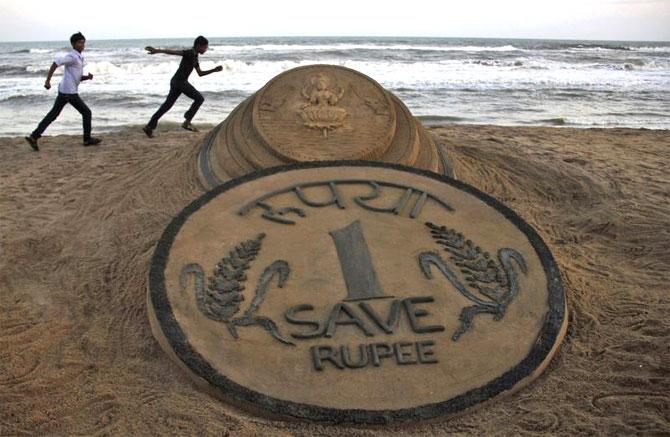 An analysis of the frequency of various watchwords in the finance minister's Budget speech shows that he was perhaps trying to hold on to his ideas without treading on anybody else's toes, says A K Bhattacharya.
An analysis of the frequency of various watchwords in the finance minister's Budget speech shows that he was perhaps trying to hold on to his ideas without treading on anybody else's toes, says A K Bhattacharya.
Many experts and analysts have commented on the unusually long Budget speech that Finance Minister Arun Jaitley delivered last Thursday.
To be precise, the total number of words used by Jaitley in his speech for Budget 2014-15 is 16,473. This is obviously much longer than Jaitley's predecessor, Palaniappan Chidambaram's interim Budget speech for 2014-15, which contained 6,581 words.
That, however, is not a fair comparison. Interim Budget speeches are usually much shorter than the full Budget speeches. So what did Chidambaram do in his last full Budget speech?
Well, his Budget speech for 2013-14 contained 12,719 words, a few thousand words fewer than what Jaitley used for his address.
An even better comparison would be with the first Budget speech of a new government after the elections. And by that yardstick also, Jaitley's speech scores over them by a long margin.
Chidambaram's Budget speech in July 2004 contained 13,216 words and Pranab Mukherjee used 11,771 words in his Budget speech delivered in July 2009.
You will now know why Jaitley's first Budget strained the patience of almost everybody who had to listen to his speech.
As a former advisor to a finance minister said quite pithily, if the minister wrote his own speech, he should hire someone; and if someone else wrote his speech, that person should be replaced!
Yet there are many takeaways from the speech, if you simply count the number of times the finance minister has used a few of his favourite watchwords. "Development" is one of them.
Jaitley has used this word on as many as 55 occasions. "Growth" has been used 31 times. And when you find that he has used the word "projects" on as many as 23 occasions, the Budget's obsession with sprinkling the whole country with all kinds of projects in different corners becomes obvious.
Interestingly, "inflation" figured only six times in Jaitley's speech. Chidambaram had used "inflation" as a word nine times in his interim Budget speech, presented in February this year and 14 times in his full Budget speech for 2013-14. What about "reform"? Well, Jaitley used that word only on six occasions, while Chidambaram used it two or three times.
You might argue that this is not an ideal way of judging the policy focus of a Budget speech. That argument may have some merit. But what happens when you notice that in the entire speech containing 16,473 words, there is no mention of disinvestment even once?
We are not talking about privatisation here. Disinvestment is all about sale of the government's equity in public sector undertakings. And if you dig deeper into the Budget documents, you will see the government wants to mobilise over Rs 63,000 crore (Rs 630 billion) from the sale of government shares in companies. This is not a small amount - about three and a half per cent of the size of the total government Budget.
Yet the Budget speech of Jaitley ignores this massive revenue mobilisation plan. To put this in context, disinvestment proceeds are the single largest item in the government's total capital receipts other than debt.
Last year, the government managed to mobilise about Rs 26,000 crore (Rs 260 billion) from disinvestment.
A plan to increase disinvestment receipts by 142 per cent would require great effort and suitable planning if the target is to be achieved in the remaining nine months of the current financial year. So, why was there no mention of disinvestment in Jaitley's long Budget speech?
One possible explanation could be Prime Minister Narendra Modi's belief that public sector units could be turned around if they are led by professional managers and given functional autonomy.
This is one of the key elements of the famous Gujarat model of development pursued by Modi as the state's chief minister in the last decade. The election manifesto of the Bharatiya Janata Party, too, was ambivalent on the question of disinvestment of government shares in public sector undertakings or PSUs.
Remember that this meant a complete departure from the policy of strategic sale of PSUs followed by the government of Atal Bihari Vajpayee from 1998 to 2004. So, by relying on disinvestment in a big way, Jaitley's Budget was strictly not following the Modi mandate. And this was perhaps why the Budget speech refrained from making any reference to disinvestment.
In sharp contrast, Jaitley's Budget speech devoted an entire paragraph to claim how the Budget would ensure a capital investment of Rs 2.48 lakh crore by the PSUs in the current financial year.
This investment, Jaitley said, was aimed at creating "a virtuous investment cycle". But take a close look at the Budget numbers and you will notice that such capital investment by the PSUs in 2013-14 was higher at Rs 2.58 lakh crore.
In other words, investment by the PSUs in the current financial year would be about four per cent less than what was invested in 2013-14.
So, a huge increase in the government's disinvestment plan does not merit a mention in the Budget speech, but a lower figure of investment by the PSUs is presented as a Budget initiative to revive the investment cycle!
Is that an attempt at political management of Budget initiatives?
Please click here for the Complete Coverage of Budget 2014 -15











